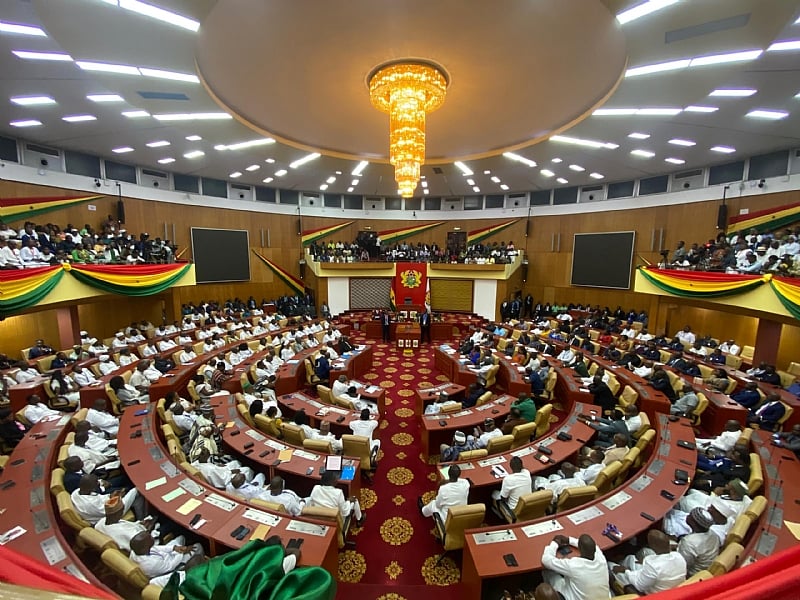The dawn of Tuesday, January 7, 2025, heralded a new chapter in Ghana’s political landscape with the inauguration of the 9th Parliament of the Fourth Republic. The ceremony, held at Parliament House in Accra, signified the commencement of a fresh legislative session following the dissolution of the 8th Parliament at midnight. The event was steeped in tradition and symbolism, marking the peaceful transition of power and the continuation of Ghana’s democratic processes. The presence of family members, friends, and dignitaries underscored the significance of the occasion, reflecting the nation’s collective investment in its parliamentary democracy. The inauguration, however, was not without its share of legal controversies, casting a temporary shadow over the otherwise celebratory proceedings. The overall atmosphere, though tinged with legal tension, remained one of optimism and anticipation for the new legislative session.
Alban Sumana Kingsford Bagbin, the seasoned politician and former Speaker of the 8th Parliament, was re-elected to the speakership, solidifying his position as a central figure in Ghana’s legislative branch. His re-nomination by the National Democratic Congress (NDC) and subsequent endorsement by the majority of Members of Parliament underscored his respected status and extensive experience. Following his swearing-in by Chief Justice Gertrude Torkornoo, Speaker Bagbin presided over the oath-taking ceremony for 275 Members of Parliament-elect. This act symbolized the formal commencement of their duties and responsibilities, marking the beginning of their tenure in the 9th Parliament. The absence of the Ablekuma North constituency representative due to ongoing electoral disputes highlighted the complexities inherent in electoral processes and the potential for legal challenges to impact parliamentary representation.
The 2024 general elections had significantly reshaped the political dynamics in Parliament, with the NDC securing a majority of 183 seats out of 276. This victory afforded the NDC the opportunity to appoint key leadership positions, further consolidating their control over the legislative agenda. Cassiel Ato Forson assumed the role of Majority Leader, entrusted with guiding the party’s legislative strategy. Emmanuel Armah-Kofi Buah was appointed Deputy Majority Leader, providing support and ensuring the smooth functioning of the parliamentary majority. Governs Kwame Agbodza took on the responsibility of Majority Chief Whip, tasked with maintaining party discipline and ensuring attendance for crucial votes. Ahmed Ibrahim was appointed Deputy Majority Chief Whip, assisting in the management of the parliamentary majority and ensuring its effectiveness. This new leadership structure positioned the NDC to exert significant influence on the legislative process and shape the direction of policy-making in the 9th Parliament.
The legal dispute surrounding the Akwatia parliamentary seat emerged as a significant point of contention during the inauguration. The Koforidua High Court had issued an injunction on January 2, 2025, preventing Ernest Kumi, the New Patriotic Party (NPP) candidate, from being sworn in as a Member of Parliament-elect. The injunction, stemming from a petition filed by the NDC candidate, Henry Boakye Yiadom, alleged irregularities in the December 7, 2024 elections. This legal challenge added a layer of complexity to the inauguration process, raising questions about the final composition of Parliament and the representation of the Akwatia constituency. The NPP, represented by counsel Gary Nimako Marfo, contested the injunction, arguing that it was improperly filed and that election results could only be challenged within a specific timeframe. However, the court upheld the injunction, delaying Kumi’s participation in the swearing-in ceremony and creating uncertainty about the future resolution of the Akwatia seat dispute.
Despite the NPP’s objections and arguments regarding the legality of the injunction, the court’s decision remained in effect, preventing Kumi’s immediate participation in the parliamentary proceedings. Minority Leader Alexander Afenyo-Markin expressed the NPP’s stance that Kumi was prepared to be sworn in and participate in the Speaker election, even if it meant facing potential legal repercussions. However, Clerk Ebenezer Ahumah Djietror clarified that allowing Kumi to participate would constitute a direct violation of the court order, highlighting the delicate balance between respecting legal processes and ensuring the smooth functioning of Parliament. This legal impasse emphasized the complex interplay between judicial decisions and parliamentary procedures, showcasing the potential for legal challenges to disrupt or delay the legislative process.
The inauguration of the 9th Parliament, while marked by the legal controversy surrounding the Akwatia seat, ultimately represented the continuation of Ghana’s democratic traditions. The NDC, with its newly secured majority, was poised to wield considerable influence in shaping the legislative agenda, setting the stage for a period of potentially significant policy changes. Speaker Bagbin’s re-election provided a sense of continuity and experience, suggesting a steady hand guiding the parliamentary proceedings. The legal challenges, though disruptive, highlighted the importance of established legal processes in resolving electoral disputes and ensuring the integrity of democratic institutions. The 9th Parliament, therefore, began its tenure amidst a mix of anticipation, legal maneuvering, and the promise of a vibrant legislative session that would shape the future direction of Ghana.


